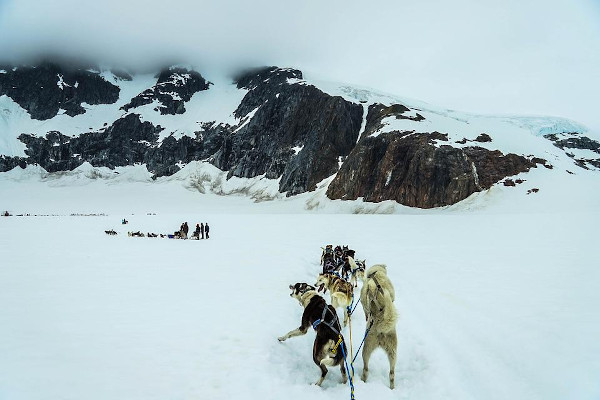In Praise of Life in the Last Frontier in ‘Nobody Gets Out Alive’

Nobody Gets Out Alive: Stories
By Leigh Newman
Scribner
288 pages
Of all the states in the union, Alaska might be among the most underrepresented in literature. What novels come to mind when thinking about the 49th state? There’s Call of the Wild by Jack London and, in a different vein entirely, Alaska by James Michener. Of course, more recent novels are also set in the Last Frontier, but not many come readily to mind.
Leigh Newman, author of a new story collection, Nobody Gets Out Alive, emerges as a contender in this narrowly defined literary sweepstakes. In these stories, men (and in some cases, women and children) camp in the wild, fish for king salmon, paddle down the turbulent Deshka river, and hunt wolves from single-prop planes.
Dogs are a recurring motif. Dutch, the narrator of “Howl Palace,” the opening story (and among the strongest in the collection), has strong feelings about black Labs, having raised a slew of them in her long lifetime. Of these dogs, she says:

“… no matter how you deal with these animals at home—stick or carrot—they just can’t deviate from the agenda panting through their minds, an agenda born of instinct and inbreeding, neither of which suggests that they sit there wagging their tails when a bumblebee flies through a yard. Or a bottle rocket zooms by.”
In her late 60s, Dutch has married five times, been a widow once. She is presently setting up an open house for the sale of her longtime residence, known locally as “Howl Palace.” Interspersed throughout the preparations for the real-estate event are her recollections and reflections on a long line of husbands and lovers, including, most notably, an older man named Carl, “the beautiful, bedeviling heartbreak of my life.”
Among other things, Dutch bemoans the complacent citizenry of modern-day Alaska, while imagining a black Lab named Pinkie making her escape from domestic life:
“Pinkie was charging down the shoreline, trampling kiddie pools and sprinklers, digging into professional-grade landscaping while mothers chased after her with shovels and fathers contemplated lawsuits and the implications of those lawsuits at the homeowners association meeting—all of which they could avoid if they just jumped in the plane and took off for a few hours to remember why they had moved to Alaska in the first place.”

The title story recounts the mysterious sexual politics at a wedding party in Anchorage for Carter and Katrina, hosted by Katrina’s old friend Neil. At one point, Neil lavishes praise on Carter—“which, Carter realized, is exactly what you do when you plan on sleeping with someone else’s wife. You seduce her husband.”
Much of the underlying tension between the three principals is rather vague, not helped by an occasionally clunky image (“Katrina … had shot into his life like a blond, carnivorous meteor”). Unlike, say, the opening story, its overall theme and purpose remain elusive.
What emerges most strongly in Nobody Gets Out Alive is Newman’s love of and appreciation for this last frontier—its wildlife, topography, and the skewed, rugged psyches of those who choose life in such a remote and challenging environment. The author of a memoir set in Alaska called Still Points North, she demonstrates a keen understanding of what it takes to survive in this state, and why its residents often differ strongly from their compatriots in the Lower Forty-Eight.
Author Bio:
Lee Polevoi, Highbrow Magazine’s chief book critic, is the author of a novel, The Confessions of Gabriel Ash, forthcoming in 2023.
For Highbrow Magazine
Image Sources:
--Michelle Raponi (Pixabay, Creative Commons)
--Janeb 13 (Pixabay, Creative Commons)
--Scribner































































































































































































































































































































